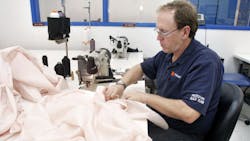TOKYO — The Takata crisis deepened on Wednesday as its shares plunged after news that Honda was dumping it as an airbag parts supplier and U.S. safety regulators slapped it with a record fine.
The company’s stock fell nearly 20% in afternoon trading as investors reacted to the latest bad news for the embattled firm, whose airbags have been linked to at least eight deaths and scores of injuries globally. It ended the day 13.4% lower at 1,189 yen ($9.80) a share, its lowest close this year.
Japanese financial markets were closed Tuesday for a public holiday, so Wednesday was the first time the Tokyo-listed stock had been tested since the double whammy.
Takata’s airbag defect — thought to be associated with a chemical propellant that helps inflate the devices — can cause them to deploy with explosive force and send metal shrapnel hurtling toward drivers and passengers, in some cases killing them or leaving grisly injuries. Some 19 million U.S. vehicles, and millions more worldwide, are equipped with the airbags, which has led to massive recalls.
Accusing the company of dodging the issue for years, U.S. safety authorities announced up to $200 million in penalties on Tuesday, while Honda said it would stop using Takata airbag inflators.
“On a global basis, no new Honda and Acura models currently under development will be equipped with a front driver or passenger Takata airbag inflator,” the automaker said.
Hiroshi Shimizu, Takata’s senior vice president for global quality assurance, said it was studying the decision by Honda, which accounts for about 10% of the company’s $5.3 billion in annual global sales.
“We want to understand their intention,” Shimizu said of Honda’s decision.
‘Surprised and Disappointed’
Toyota, another Takata client, said it was monitoring the latest chapter in the crisis.
“We are continuing to investigate Takata-manufactured airbag inflator issues,” and will take necessary actions, it said in a statement.
Rival Nissan declined to comment on its future relationship with Takata, though the company did say, “we are obviously surprised and disappointed with Takata concerning the findings about its conduct” in the U.S. regulator’s statement.
A day earlier, the National Highway Traffic Safety Administration said the auto parts maker had evaded reporting requirements, including making “the conscious decision” not to report two incidents to the regulator, despite a mounting death toll linked to its airbags.
The agency said Takata showed a pattern of such behavior dating back to 2009, both with the U.S. government and with automakers who installed the airbags in their cars.
“For years, Takata has built and sold defective inflators. It refused to acknowledge that they were defective,” Transportation Secretary Anthony Foxx said. “Delay, misdirection, and refusal to acknowledge the truth allowed a serious problem to become a massive crisis.”
Takata also faces a Justice Department probe into its behavior, with the possibility of more fines arising from that.
But the transport regulator also said that because Takata had been more cooperative in recent months, it would have to pay $70 million initially, with additional amounts to be levied only if it further violates the regulator’s orders or the US Motor Vehicle Safety Act. In response Takata said it was “committed to being part of the solution.”
“This settlement is an important step forward for Takata that will enable us to focus on rebuilding the trust of automakers, regulators and the driving public,” chairman and CEO Shigehisa Takada said in a statement.
The watchdog said it was ordering a dozen global automakers with the dangerous Takata airbags in their cars to speed up recalls to replace them, and to set a priority for those cars at highest risk.
By Hiroshi Hiyama
Honda: Profit Up, but Takata Costs Lurk
In related news, Honda announced Wednesday that its half-year net profit jumped as strong North American sales helped offset the impact of the Takata crisis and sluggish demand in the Japanese market.
Honda’s net profit in the six months through September rose 14% to 313.7 billion yen ($2.59 billion), while sales jumped more than 15% to 7.32 trillion yen ($60.36 billion).
Nissan raised its full-year forecasts on Monday, citing new model rollouts and a strong North American market. Toyota is set to report its latest earnings results this week.
Japanese automakers have benefited significantly from healthy growth seen in the U.S. market with low interest rates, while the weaker yen has made them relatively more competitive overseas and inflated the value of repatriated overseas profits.
Sales have been sluggish in their home market, however, after a sales tax rise last year dented consumer spending and as younger urban residents delayed buying a vehicle.
“Honda is showing strong results,” said Shigeru Matsumura, analyst at SMBC Friend Research Center. “The impact of airbag recalls on Honda is receding, while its sales are expected to grow in North America thanks to its planned introduction of new Civic models.”
This summer Honda revised down its annual earnings for the previous fiscal year, blaming the expanding recalls of faulty Takata airbags.
Of the dozen global automakers affected by the auto parts crisis, Honda has been the hardest hit, with the company recalling more than 24 million vehicles to fix the deadly defect.
Honda repeated previous warnings Wednesday that the extent of future airbag-linked costs remained elusive. “It is not possible for Honda to reasonably estimate the amount and timing of potential future losses” linked to the crisis, it said, pointing to more possible lawsuits. The company said it has allocated an unspecified sum to cover the expected cost of future recalls.
Copyright Agence France-Presse, 2015
About the Author
Agence France-Presse
Copyright Agence France-Presse, 2002-2025. AFP text, photos, graphics and logos shall not be reproduced, published, broadcast, rewritten for broadcast or publication or redistributed directly or indirectly in any medium. AFP shall not be held liable for any delays, inaccuracies, errors or omissions in any AFP content, or for any actions taken in consequence.
